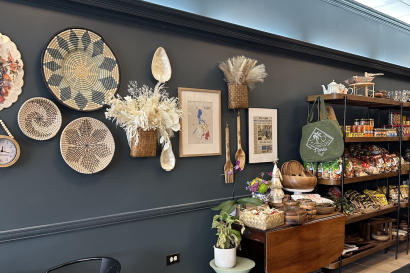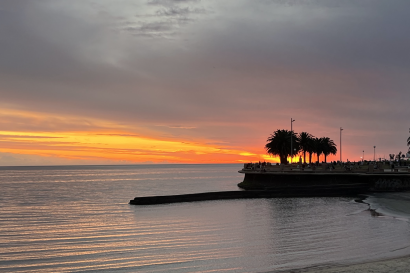
As in the U.S., Sunday was Mother’s Day in Chile. At every street corner, vendors with their hands full of heart-shaped balloons and single-packed roses jumped out into the street at red lights to sell gifts for Mom through car windows. My host mom had gone to her mother’s house for the day, and so I headed to the park to enjoy the still-warm fall weather. I picked up some pad Thai from a food truck and wandered around families taking pictures and moms holding daughters’ hands as they ran around the fountains and chased birds. I called my own mom. We talked for maybe an hour, catching up and reminiscing, as she had gotten together with families from my elementary school that weekend. I’m not usually one to wish I were in another place, generally enamored with wherever I find myself and sad to leave regardless of what exactly I’m leaving behind. However, I found myself wishing I were a part of one of the families around me, or with my own.
As the sun started to set, turning the Andes and glass office buildings pink, I made my way back home. On the walk, a bouquet of purple and yellow flowers that matched the living room in our apartment caught my eye—perfect for a last-minute Mother’s Day gift. Flowers in hand, I opened the door and my host mom had also just arrived. When she saw the bouquet, she threw her arms up and then around me in her fabulous way. Mi niña! I do have a family here, I remembered.
Chile institutionally encourages motherhood, and this plays a complicated role in the lives of Chilean women. For example, analgesia during childbirth is covered by the Explicit Health Guarantees (GES), a group of over 80 health conditions with respect to which access to quality, timely care and financial protection are guaranteed by the Chilean government. This is a fantastic initiative, but treatments related to the prevention of pregnancy (contraception, day-after pill) are not guaranteed and often hard to come by. Only two years ago did Chile take steps to leave the list of just six countries where abortion is penalized in all cases (remaining are El Salvador, Nicaragua, Dominican Republic, Malta, and the Vatican). Maternity leave, a full six weeks pre-birth and 24 weeks after, is not only provided but mandatory, another complicated example of a generous benefit with patriarchal implications. This also leads to hiring discrimination (new fathers receive six days).
What’s clear, though, is the vital role that mothers play in Chilean life. Living with a mom again is somewhat strange to me, after years of living many hours away from home. But in Latin America, it’s completely normal to live with your parents until graduation or later. Moms here feel like the core of the household and are generally responsible for cooking, organizing, and emotional wisdom, on top of the professional jobs that many also hold.
The other night, I was out with friends and ended up chatting with a Chilean guy for a while. In classic dramatic fashion, he leaned toward me and declared, “Te amo, Thea.” I love you.
I rolled my eyes. “No, you don’t.”
“You don’t believe in love at first sight? You don’t love me?”
“No,” I laughed. “I don’t love anyone.”
He gasped. “Not even your mom?”
My joke was lost in translation, and thankfully not because of my Spanish. It was inconceivable to him, first and foremost because it would mean not loving the backbone of the family, the mamá. The role of women in Chile (as in many places in the world) may be complicated, but the deep love and respect for mothers is not. It’s a nice reminder for me, as I head back next month to the more individualistic United States. There are certainly pros and cons to the independence and self-sufficiency that leaving home at 18 fosters, but it’s also sweet to remember how much value there is in family.

Thea Lance
<p class="MsoBodyText" style="margin-top:.4pt; margin-right:20.75pt; margin-bottom:.0001pt; margin-left:5.5pt"><span style="line-height:103%">I'm a lover of adventure, whether that's climbing mountains or exploring a new city. This has taken me from my hometown in North Carolina to the arctic circle and beyond, and most recently to Chile! I'm majoring in Biology on a pre-medical track, and I am thrilled to be learning medical Spanish in Santiago this semester.</span></p>








